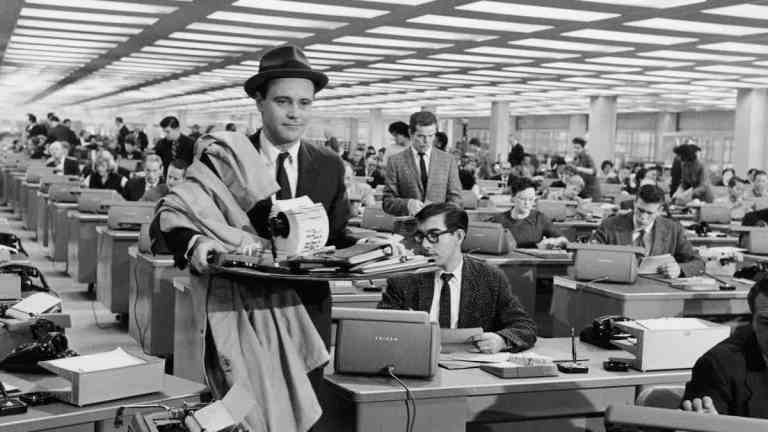How The Apartment Shaped Cinema’s View of the Workplace
This month marks the 60th Anniversary of Billy Wilder’s The Apartment - it’s a sharp satire that influenced everything from 9-5 and Office Space to Mad Men and more.

The cinema is usually where audiences go to escape the monotony of the daily grind, but filmmakers are often keen to drag us back to the offices where we reluctantly spend our lives. The farce and boredom of the corporate ladder is an ideal arena for comedy, and never has it been mocked more forensically than in Billy Wilder’s 1960 romantic comedy-drama, The Apartment. Following the professional and romantic relationships in the life of a sheepish insurance clerk, the film centred the role of the workplace in shaping our everyday existence, and in doing so set the template for decades of imitators on both the big and small screen. Now celebrating its 60th anniversary, The Apartment remains a timeless satire of the modern workplace.
Arriving on the tails of Wilder’s huge success with the madcap 1959 comedy Some Like it Hot, The Apartment represented a more down-to-earth effort for the veteran director, drawing comedy from a vein of social realism rather than the burlesque absurdity of his previous movie. In this spirit, the opening narration of The Apartment foregrounds the stultifying uniformity of office life.
Our protagonist, CC Baxter (Jack Lemmon), provides a detailed account of a day in the Consolidated Life insurance firm. As Baxter explains, he is just one of 31,259 employees in his New York office, sitting at desk 861 on the 19th floor. The camera closes in on his workstation, singling him out from an endless morass of people doing exactly the same thing at their own identical desks. Baxter is an anonymous drone within a huge, corporate hive – that is, until the evening bell rings at 4:50 pm and he stays seated while his hundreds of colleagues make for the elevator and home.
Baxter remains not because he enjoys working overtime, but because he has nowhere else to go; his apartment has become the love nest of choice for a network of adulterous bosses. Through vague threats and promises of advancement, Baxter has been cajoled by superiors into pimping out his home. With this central conceit, Wilder casts a withering eye over the bewildering hierarchy of relationships to which we are forced to submit during office hours. Like so many modern workers, Baxter sacrifices his home life – quite literally in this case – for the sake of his career prospects.
While this corporate landscape remains a familiar prospect to modern audiences, at the time of the film’s release it was a relatively new phenomenon. The economic miracle of the Second World War had brought unprecedented wealth and prosperity to the United States, propelling millions of Americans into the sort of white collar jobs in which Baxter finds himself. Between 1940 and 1960, for example, the proportion of the US population living in an urban environment increased from 56.5 to almost 70 percent.
The Apartment was one of the first movies to capture this brave new world of employment, in which commuting workers pour like ants into the arterial elevators of skyscraper office buildings and busy themselves with dull administrative duties. A crucial scene has Baxter calling each of his three managers, one after the other, in order to reschedule their respective trysts, so that he might have the apartment to himself for one evening. It’s a brilliantly scripted depiction of tiresome bureaucracy which feels maddeningly recognizable from the perspective of 2020, as though Baxter may as well be trying to reschedule a Zoom conference call. In exposing the crushing reality of middle class professional life, the film struck a chord with audiences, and it has continued to define our understanding of the workplace on screen.
During the six decades since the film’s release, several generations of filmmakers have followed Wilder’s lead in mining the world of work for laughs. This lineage can be traced in big screen comedies from Colin Higgins’ 9 to 5 (1980) through to Mike Judd’s Office Space (1999) and even Seth Gordon’s Horrible Bosses (2011), all of which echo The Apartment in satirizing the suffocating etiquette and exploitation of the corporate environment.
Meanwhile, on television, sitcoms like Ricky Gervais and Stephen Merchant’s The Office (2001-03), and its American remake, focus on the peculiar relationships which develop between colleagues. In all these works, it is the familiarity and tedium of the office-bound setting which lies at the core of their hilarity. When watching characters on screen go about their excruciating desk jobs, we laugh at ourselves as much as them.
The linchpin of The Apartment‘s enduring appeal is Jack Lemmon’s infectious lead performance. His nervous energy in the role of embattled everyman CC Baxter provides a sympathetic surrogate for the audience at the centre of the story, and sets the standard for discontented protagonists like Pete Gibbons in Office Space or Tim Canterbury/Jim Halpert in The Office. Baxter’s exasperation in dealing with the demands of his various colleagues and superiors is familiar to all, as is his reluctance to stand up for himself against their demands. Beneath an awe-inspiring penchant for physical comedy, Lemmon imbues his character with a melancholy which suggests a yearning for something more meaningful than his empty nine-to-five – a solace which Baxter eventually finds in the form of elevator operator and object of his affections, Fran Kubelik (Shirley MacLaine).
The role of women in the workplace was another relatively new development in 1960. Spurred by two world wars and increasing social and political agency, the rate of women entering the workforce tripled after 1950, and The Apartment doesn’t shy away from this cultural shift. The casual sexism of the bosses at Baxter’s firm and their sexual exploitation of female employees are key themes in Wilder and IAL Diamond’s script. It’s an uncomfortable depiction which remains depressingly pertinent 60 years later in light of the ongoing struggle for workplace equality and the #MeToo movement.
Shirley MacLaine’s delicate portrayal of Fran Kubelik provides a voice to the women who live and work within this aggressively male environment, and her victimization and abuse takes a dreadful toll. Indeed, the film largely forgets to be a comedy for the lengthy second act sequence in which Fran attempts suicide. Wilder’s exploration of gender imbalances prefigures later films which more directly examine the female experience in the workplace, from the aforementioned 9 to 5 to more recent efforts like Jay Roach’s sexual harassment drama Bombshell (2019).
While many of the concerns raised in The Apartment feel timeless, much of the film’s charm can also be attributed to elements which are firmly of their own time. The luscious black-and-white cinematography, beautifully framed in anamorphic by director of photography Joseph LaShelle, captures a seductive world of mid-century glamour which would soon be lost in the revolutionary haze of the sixties.
Every character is costumed with an unobtrusive but unmistakably elegant eye; Baxter wears the impeccably fitted suits and skinny ties that were the uniform of the age, while Fran adorns herself with pearls and furs. The whole movie has an innate sense of style which could be from no other era than the tale end of the fifties, and this aesthetic has been a source of inspiration to numerous period pieces, notably Matthew Weiner’s TV drama Mad Men (which even mentions The Apartment directly in its first season).
The workplace comedy is a well trodden genre, and the shadow of The Apartment looms large over it. Wilder parodied the conventions of the corporate structure just as it had come into being, and in doing so exposed the boring customs and inequitable relationships which office workers continue to tolerate 60 years later. However, it is not the superficial similarities of office life in The Apartment which make it so abiding, but the human stories within it. The dull realities of Baxter and Fran’s day jobs may remind us of our own toils, but it is their search for meaning and eventual happiness together with which we can truly identify.
